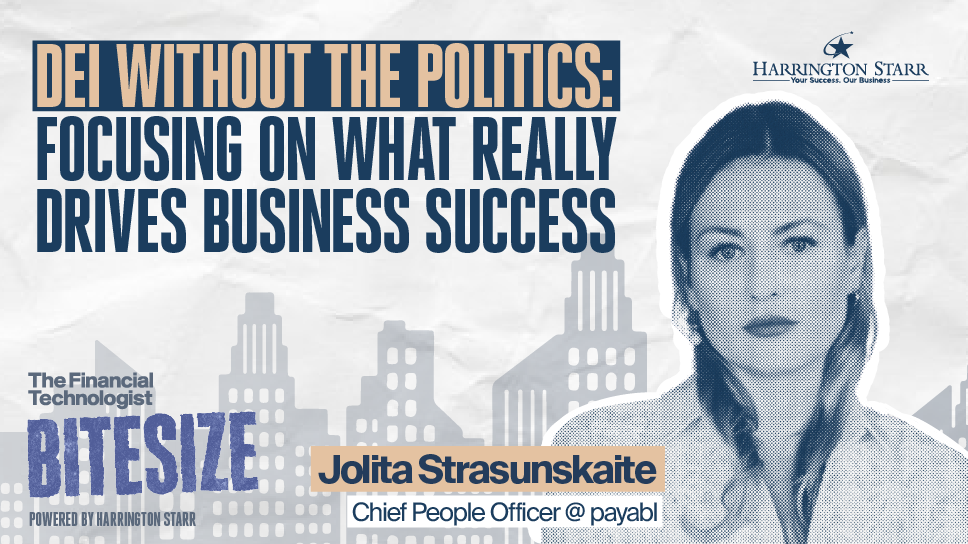Diversity, equity, and inclusion (DEI) initiatives are now an essential part of the modern workplace.
Designed to address discrimination, biases (both conscious and unconscious), and marginalisation whilst creating a culture of respect and inclusion, such initiatives can take many forms – whether that’s training and education programmes, equitable hiring practices, or even policy changes.
However, more and more people across the business world are expressing concerns about how DEI initiatives are often handled politically, with too much emphasis placed on simply ticking boxes or fulfilling quotas. Even the fintech industry, which is known for its innovative and agile business models, faces a significant diversity problem that threatens to halt its growth and stop that innovation from reaching its full potential.
Some companies are even pulling back from DEI initiatives amidst nervousness around shareholder activism and possible investor or customer pushback. And like greenwashing in environmental initiatives, DEI-washing is becoming a more commonly seen term. This involves companies presenting an external DEI commitment without enacting substantive change – such as prioritising social media posts ahead of actual social development.
It’s time to move away from political narratives and instead focus on DEI’s genuine value – improving team productivity, employee wellbeing, and – ultimately – long-term business success. But how can companies make this shift?
Making a Business Case for Better DEI Initiatives
The first thing to do is realise that DEI is much more than just a box-ticking exercise: it should be considered a culture, vision, and indeed a way of life for ambitious organisations. DEI is a business driver, not just a political agenda.
To steer clear of superficial actions, fintechs and other companies must first establish and communicate a robust DEI vision. Commitment from the leadership team is essential; they are the ones who must drive the changes to realise this vision.
It’s therefore crucial to demonstrate DEI’s true value to executive leadership. Luckily, the evidence is readily available, with research consistently showing that heightened productivity and increased profits follow a greater focus on diversity and inclusion.
According to Deloitte, for example, companies that recruit, retain, and advance diverse talent have 27% higher profitability, 38% higher customer satisfaction, and 22% greater productivity.
A recent study by Boston Consulting Group, meanwhile, showed that companies with above-average diversity on their management teams report innovation revenue 19% higher than companies with below-average leadership diversity.
The Boston Consulting Group study also revealed the impact of DEI initiatives on attracting and retaining the talent that drives business success. In a world where companies are reporting significant talent gaps, it makes good sense to recruit from a more diverse pool. The research highlighted that companies that prioritise inclusion in the workplace can slash attrition risk by 50%, with employees who witness or experience discrimination, bias, or disrespect nearly 1.4 times more likely to quit their job.
And when employees believe that DEI is a genuine corporate leadership priority, the number of employees who are happy increases by 31%, while those who feel motivated increases by a quarter (25%).
Drawing on Data to Shape a MoreImpactful DEI Strategy
In the age of Open Banking, Open Finance, and – increasingly – Open Data, businesses have more information to leverage than ever before. They need to start taking advantage of this.
Data provides a firm foundation for business leaders to identify gaps in DEI policies, measure progress, and make more informed decisions. It enables organisations to gain deeper insights into their workforce demographics, representation, and employee experiences. Such insights help identify areas of improvement but also establish benchmarks to track progress over time.
However, nearly eight in ten business leaders aren’t using data in their company’s DEI practices, according to Salesforce research. This needs to change. Using data to make smarter decisions will help create a culture that embraces diversity, fosters innovation, and paves the way for long-term success.
Businesses should measure the indicators of diversity and inclusion, not just the outcomes. By approaching DEI as they would any other businesses initiative, guided by KPIs that are measurable, they can review the success of different initiatives and learn from what works – and what doesn’t.
Businesses should keep track of their recruiting statistics, and work to ensure equity in pay, promotion, and opportunity. It’s also important to measure employee inclusion to ensure underrepresented groups feel fully included in the workplace, thus enhancing retention.
They should also be mindful of the role of good, honest communication. By being open about progress, and any areas where it’s perhaps taking longer to make progress, they can ensure all stakeholders remain engaged. Using data to demonstrate the impact of DEI initiatives on company performance is the best way to address any criticism.
DEI isn’t just a nice-to-have anymore. In an increasingly complex and competitive global market, business leaders need to use the wealth of data at their fingertips to create DEI initiatives that help them access and nurture the best talent, regardless of gender, race, or sexual identity. That’s the way to secure sustained business success whilst meeting their moral imperative of providing an environment in which anyone can flourish.
By Jolita Strasunskaite, Chief People Officer, payabl.







